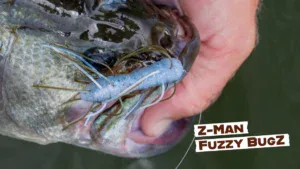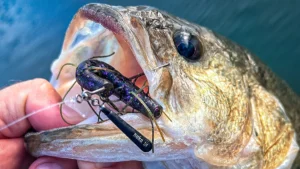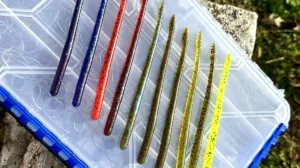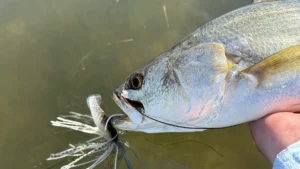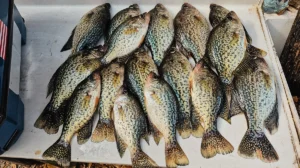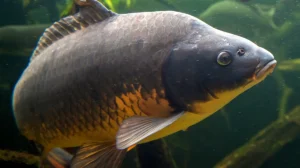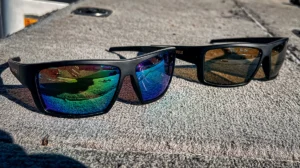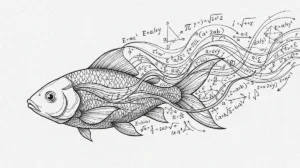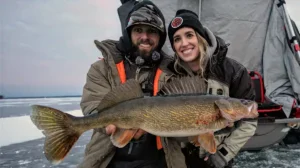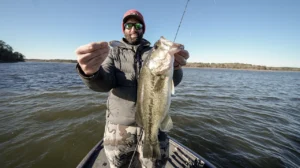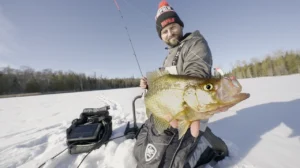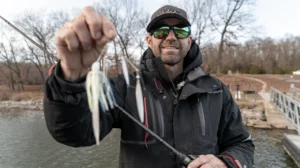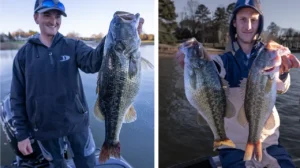If you’re just getting into bass fishing, you’re likely overwhelmed by all the different types of fishing lures. Even if you’ve been at it for decades, you know that the landscape is always changing with new twists on old classics and innovative designs popping up.
The purpose of this piece is to gather information on several different types of lures for bass fishing with brief overviews of each type. You’ll find links to extensive resources on the intricacies of each genre of baits in case you’re in the mood to get off in the weeds. Let’s get started.
Types of Lures
- Jigs
- Plastics
- Topwaters
- Spinnerbaits
- Vibrating/bladed Jigs
- Crankbaits
- Jerkbaits
- Swimbaits
- Flies
Jigs

The term jig, as it relates to bass fishing, encompasses a wide range of lures. We’re talking anything from a light swim jig meant to be fished along the surface, to a heavy football jig intended to be dragged along in 20-plus feet of water.
Almost all of these jigs have a few things in common. To start, there’s a hook with some sort of molded weight on it. The jig typically has a skirt, a soft plastic trailer keeper and a weedguard. There are several types of jigs: football, finesse, skipping, flipping, casting, swim jig, grass jig and hair jig. Check out our guide to the best jigs here for more details.
Plastics

When it comes to types of lures, the plastics category is massively daunting. There are dozens of different styles of soft plastic lures, with hundreds of companies producing thousands of size, color and material variations. To attempt to take this conglomeration by the horns and condense it into a digestible list, we are mentioning baits like worms, lizards, toads, Flukes, craws, creatures, and similar others.
Plastics can be used to complement rigs like Texas rigs, Carolina rigs and drop shots. They are also often used in tandem with jigheads like Ned heads, swimbait heads and shakyheads. You can also use plastics on the back of jigs, spinnerbaits and buzzbaits as trailers. Check out our guide to soft plastics for more info.
Topwaters

There are multiple ways to slice a topic as large as “types of bass lures”. You could lump all hard plastic baits into one category, the same way we grouped all soft plastics. We instead chose to break up the hard baits into a few different categories, lumping some of them into this group of baits: topwaters.
Hard topwater baits like Spooks, poppers and Whopper Ploppers are great for catching active bass along the surface. The topwater category of lures also includes buzzbaits, hollow-body frogs and even some soft plastics like toads and weightless swimbaits. Basically, the throughline that binds all these lures together is that they are intended to target bass along the surface. They are the most effective when the waters are warmer (above 55 degrees) and the fish are more active. Head over to our guide to the best topwater lures for more information.
Spinnerbaits

For over a century now, man has been throwing something shiny at bass to try and trick them into biting. A spinnerbait is one of the longer standing lures. Let me break down a common example of one of these lures: there’s a wire arm that runs through a weighted head down into an attached hook. On the arm are metal blades along with components like spacers, beads and swivels. Most of the time, a rubber or silicone skirt is used to conceal the hook and complete the overall profile.
These baits are among the more popular offerings for bass because they are extremely versatile, appeal to all types of bass and are effective throughout a wide range of the water column. Spinnerbaits also offer up a triggering thump and tantalizing flash that draws strikes in all water temps and water colors. See our Best Spinnerbaits Guide for more information.
Vibrating or Bladed Jigs

This type of lure is sometimes lumped into the jig category, but it’s no doubt worthy of its own spot in the archives of bass fishing ever since it burst onto the scene in 2006. One of the most innovative and revolutionary lure inventions of all-time, the vibrating jig consists of a line-tie attached to a (usually) metal blade, all trailed by a skirted jig (typically without a weedguard).
Bladed jigs like the Z-Man ChatterBaits, Berkley SlobberKnocker and Strike King Thunder Cricket have accounted for hundreds of thousands of fish catches in the last couple of decades. The aggressive vibration of the blade paired with its sometimes subtle flash is the perfect combination for luring in big bass, especially in the spring. Add to this the compact nature of the lure as well as the effective bold hook that typically accompanies it, and you have the perfect power-fishing bait for a wide range of applications. See our Best ChatterBaits guide here.
Crankbaits

Crankbaits occupy another expansive subcategory of the hard plastic lure demographic. For the purposes of this conversation, we’re talking about baits like squarebills, medium diving crankbaits, deep diving crankbaits, finesse crankbaits, flat-sided crankbaits and we’ll even throw in some of the smaller wakebaits. Basically, a crankbait is any lure with a bill that is used to mimic a shad, crawfish or other subsurface forage—excluding jerkbaits, which we’ll get to in a minute.
Though most crankbaits have bills, we will also include lipless crankbaits in this category. Baits like Rat-L-Traps and Strike King Red Eye Shads. These lures are used to mimic the same forage types as other crankbaits, but they differ from these other lures in that they lack a bill and have a tendency to sink, whereas other crankbaits float. This lack of buoyancy makes lipless baits the most versatile of the crankbait category; able to be fished throughout the water column from mere inches of water out to more than 25 feet. Learn all there is to know about bass crankbaits and how to fish them here.
Jerkbaits

Jerkbaits are typically elongated, narrow, hard-plastic lures with relatively short bills and two to three treble hooks hanging beneath them. A jerkbait is one of the more effective lures when fishing in cold water because of its ability to stall and suspend in the water column.
Bass are cold-blooded creatures. So, their mood is dictated by the temperature of the water that surrounds them. For this reason, bass often become lethargic and unwilling to chase down baits in water below 50 degrees. A jerkbait is a lure that can be cranked down to the eye level of a bass and worked with a pumping and pausing rhythm, to entice the fish with a little action and then draw it in for the kill by appearing to be lethargic itself and unable to fend off an attack. See our Guide on the Best Jerkbaits here. You might also check out our guide to the Best Jerkbait Rods as well.
Swimbaits
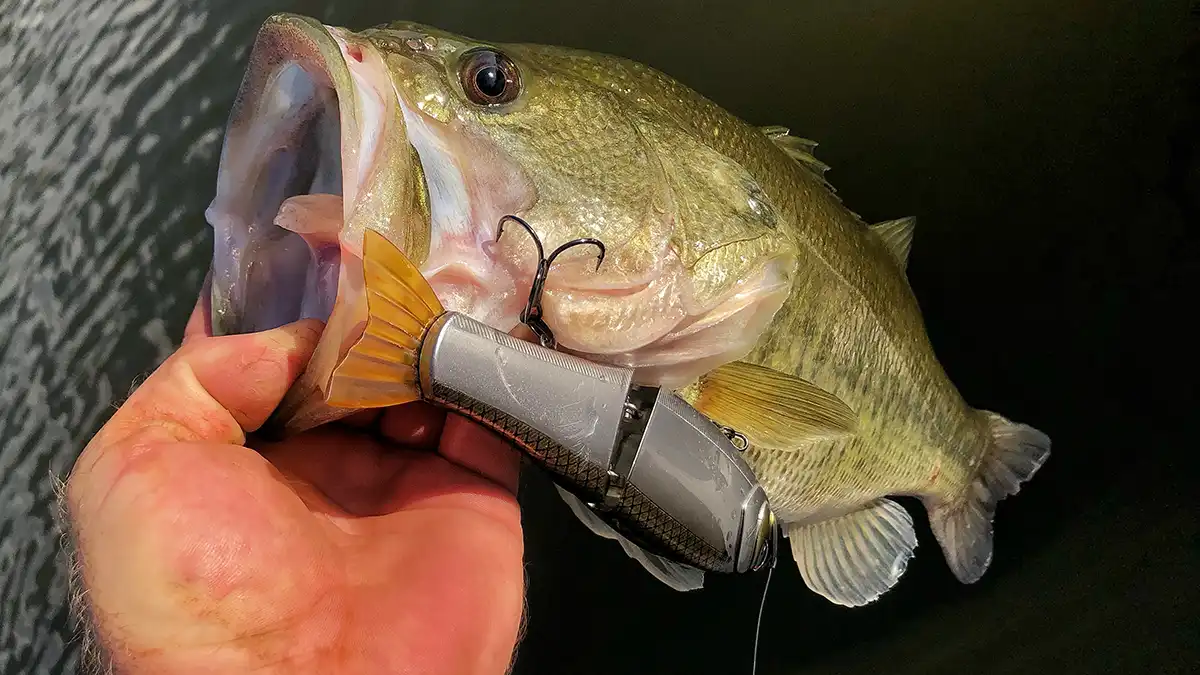
For the swimbait category, we’ll group together glide baits, multi-jointed swimbaits and big soft plastic swimbaits. The Storm Arashi Glide is a good example of a glide bait. When looking at multi-jointed swimbaits, think SPRO Sashimmy Swimmers, Bull Shads and Triple Trouts. When talking about bigger soft plastic swimbaits, we’re mean anything 6 inches and up, like the Megabass Magdraft, Berkley Powerbait Cull Shad and even bigger baits like Huddlestons.
Big swimbaits may be hard or soft and come pre-rigged with hooks or with no hook at all. In any case, these lures have a lot of drawing power and are intended for luring in the bigger than average bite, be it a kicker for a tournament angler, the fish of a lifetime for a trophy hunter or a personal best for the beginner to intermediate fan of bass fishing. Our Guide to Bass Fishing Swimbaits covers this subject in a lot more detail to help get you started on the bigger swimbaits.
Flies for Bass
Fly fishing, while requiring an entirely different host of tackle and techniques, is a fantastic way to catch bass. The opportunistic predators will readily go after a well-presented popper, streamer, or nymph. Fly fishing offers the ability for extremely precise and controlled casts, which is a huge advantage when going after bass that are feeding around submerged structure, in heavy vegetation, or near drop-offs. It’s also an extremely stealthy way to fish that allows anglers to drop flies in front of fish without spooking them.
Some of the most commonly used flies for bass include deer hair poppers for topwater fishing, clouser minnows as an all-around bass fly, the bunny leech, zonkers, crayfish patterns, Murdich minnows, and wooly buggers.
Other Lures and Final Thoughts

There are even more bait types that have been around for years, like umbrella rigs, spoons and a few others—baits that don’t fall neatly into one of these other lure categories. In addition to these long standing odds and ends, there are new types of lures being invented as we speak like the new KREJ and Finisher baits from Berkley in reaction to the rapidly changing world of forward facing sonar.
If you can grasp the differences between these main lure types and the applications and techniques each are suited for, you can become a well-rounded angler ready for whatever conditions bass fishing can throw at you. Also, check our guides for types of fishing reels and fishing rods.


